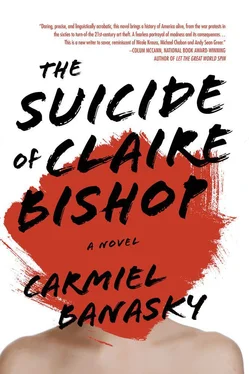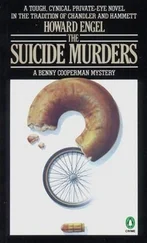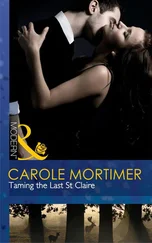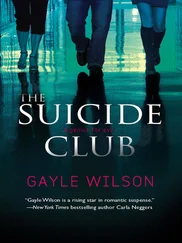Elsa was born in 1904. She was made an adult at sixteen, when her mother was hurt on the boat coming to America, 1920. Other than these dates, Elsa’s tracks had been covered up. Papers buried under snow.
Claire rummaged through the attic. She found diaries written in German and a few in English, a set of old watercolors (Claire never knew her mother had an artistic bone in her body), and boxes of photographs, warped and yellowed. She brought the best-preserved of the photos downstairs to show Elsa, tried to get her to reminisce, though it was hard to find a time Elsa was alert for long enough. She kept her eyes closed most of the day, drew a curtain, shut out the world, and Claire.
Claire began teaching herself German from an old beginner’s reader she found in the attic. She paced around the living room with the book held up in front of her face. Elsa listened to her practice, eyes closed, nodding as if in agreement to Claire’s butchered request to please pass the salt, or her overly formal greetings to imaginary Felix. Eventually, Elsa might revert back to her childhood language, Michael had said. Studying made the nights go by more quickly, anyway, when she stayed awake to stop Elsa from wandering.
She used her mother’s diaries to practice German as well. The few pages she could translate weren’t how Claire remembered things at all. One entry, written when Claire returned home for a visit, seemed a blatant lie, as if Elsa had wished to warp her future memory. It made Claire worry some for her own.
She read about the hospital in the local paper. A feature piece about the closure and dispute over landmark status. For now, it was closed for safety renovations. She read the article to Elsa once, and to herself twice more: the asylum where her grandmother had lived was being shut down.
Claire asked if Elsa remembered her mother.
“Of course I do,” Elsa said angrily. “She was mean and pompous and never home, always out at the opera. She slapped me.”
“She slapped you? Why?”
“When I was fifteen. For being with a sailor. I never told you about him? Very handsome. Your grandmother was jealous more than anything. That was long before I met your father.”
It was the most expressive Elsa had been in weeks. Claire wanted to encourage her on. “Do you remember visiting her in the hospital with me?” Claire asked.
“She was never in any hospital,” Elsa said in an accusatory tone.
Claire nodded. “All right,” she said.
She read the article again, standing alone in the kitchen. Then she threw it in the bin. It wasn’t as if she’d expected them to consult her first. But hadn’t she always planned to go back? To see it once more?
She lifted the paper from the bin.
She’d never asked her mother questions when she could have, always so self-absorbed. Now their history was lost. Now Elsa’s organs were tittering away, having a laugh with one another. Calling out who will go first, glistening at the ends of the snipped gold threads that had once connected her body to her mind.
It didn’t matter if what her mother had said was true or not, the sailor or the slap or the hospital. If that’s what was in her mind, if that was what tormented her, then it was true enough.
That night, Claire went out to her car and brought the painting inside. She hammered two nails into her bedroom wall, but she couldn’t bring herself to hang it.
She’d located the painting with the help of that man, Nicolette’s subject. It was being sold at auction, too much to bid on. The only person she knew who could afford to help was Freddie. And he did so quite willingly, a gesture of peace — after which he’d tried to sleep with Claire as compensation, his new wife at home all the while, unsuspecting.
Here she was, standing in the living room, the painting propped up against her so her mother could see.
The last time she’d shown the painting in confidence, it had been stolen from her. This time, Claire didn’t give an explanation. But, for a moment, when her mother’s eyes fluttered then steadied, Elsa seemed to understand the weight of it. That in front of her were two possibilities of Claire. Briefly, Elsa’s eyes contained all those missing years. And Claire saw that Elsa had also stood on a roof, or a bridge, and made a decision.
It is important to be known.
Elsa raised her hand in a strange gesture, above her lap, waiting. Claire laid the painting on the floor, then kneeled and rested her head in her mother’s lap. Elsa’s hand was warm and weightless on Claire’s head.
“I have a question,” Elsa said.
Claire held back her tears. “What is it?”
“I have a question,” Elsa said again, more slowly.
“Ask me.”
And Elsa said, “I have decided it’s time. I would like you to help me.”
Claire sat up and looked into Elsa’s face. Her mother’s eyes were fixed and present. “What do you mean?” Claire asked, though she knew very well what she meant.
“I would like you to help me—”
“I don’t know what you mean,” Claire interrupted her. “You aren’t making any sense.”
Elsa paused. “This is not right,” she said. “We can stop it.”
Still kneeling, Claire took her mother’s shoulders in her hands. If she were looking at herself, she would have begged someone to shoot that woman.
Elsa attempted to turn away but Claire held on. “No,” she said.
Elsa closed her eyes in acceptance or defiance, Claire didn’t know which. Once again, Claire rested her head on her mother’s lap, and Elsa replaced her hand on Claire’s hair.
“You have plenty of good years left,” Claire said.
“How long are you staying?” Elsa said after a moment.
“As long as you need me.”
When Claire was out, only briefly, returning the painting to the trunk of the car, Elsa spread all the food from the refrigerator across the living room floor. Claire gaped speechlessly at the mess. Elsa looked up at her and asked, “How long are you staying?”
She would not, or could not, stop asking the question. Three times a day, five times, Elsa asked, “How long are you staying?” And Claire replied, “As long as you need me.”
Then one day, Elsa didn’t want berries and yogurt anymore. If she spoke at all, she found new names for everyday objects. Books were stacks. Linens became rubber. The new nurse, a frumpy woman with a tattoo of a kitten on her neck, said, “Each day is the new normal.”
Claire took the nurse aside and asked what kind of options one had in the later stages of Alzheimer’s.
“What do you mean?” the nurse asked.
“I only mean, are there any options to,” Claire coughed. “Opt out?”
“You mean suicide.”
“I mean options.”
“Not in this state. People do it, but people also steal and cheat. It’s illegal.”
“So you’re saying her only choice is to rot away for decades?” Claire said.
“Did Elsa say something to you?”
“No.”
“I can help you talk to her. It’s hard to discuss what happens next.”
“I was only curious,” Claire said.
The nurse gave her an aggrieved glance, but at least she never mentioned nails protruding from the bedroom walls.
Blackberry winter. Dogwood winter. The snow wouldn’t let up. Nothing was thawing like it was supposed to.
Elsa was listening to Marlene Dietrich on the record player again. Sag’ mir, wo die Blumen sind . Dozing beneath a mountain of blankets. Elsa the volcano, hibernating. In the kitchen, Claire was sweeping up another dinnertime spill when she noticed something was missing and hurried to the living room: the record had stopped and was spinning static. Claire had hardly heard the song at all until it was gone. Elsa sat stiff and pale, no longer shuffling her feet as she often did. Did a shadow pass over her then?
Читать дальше












